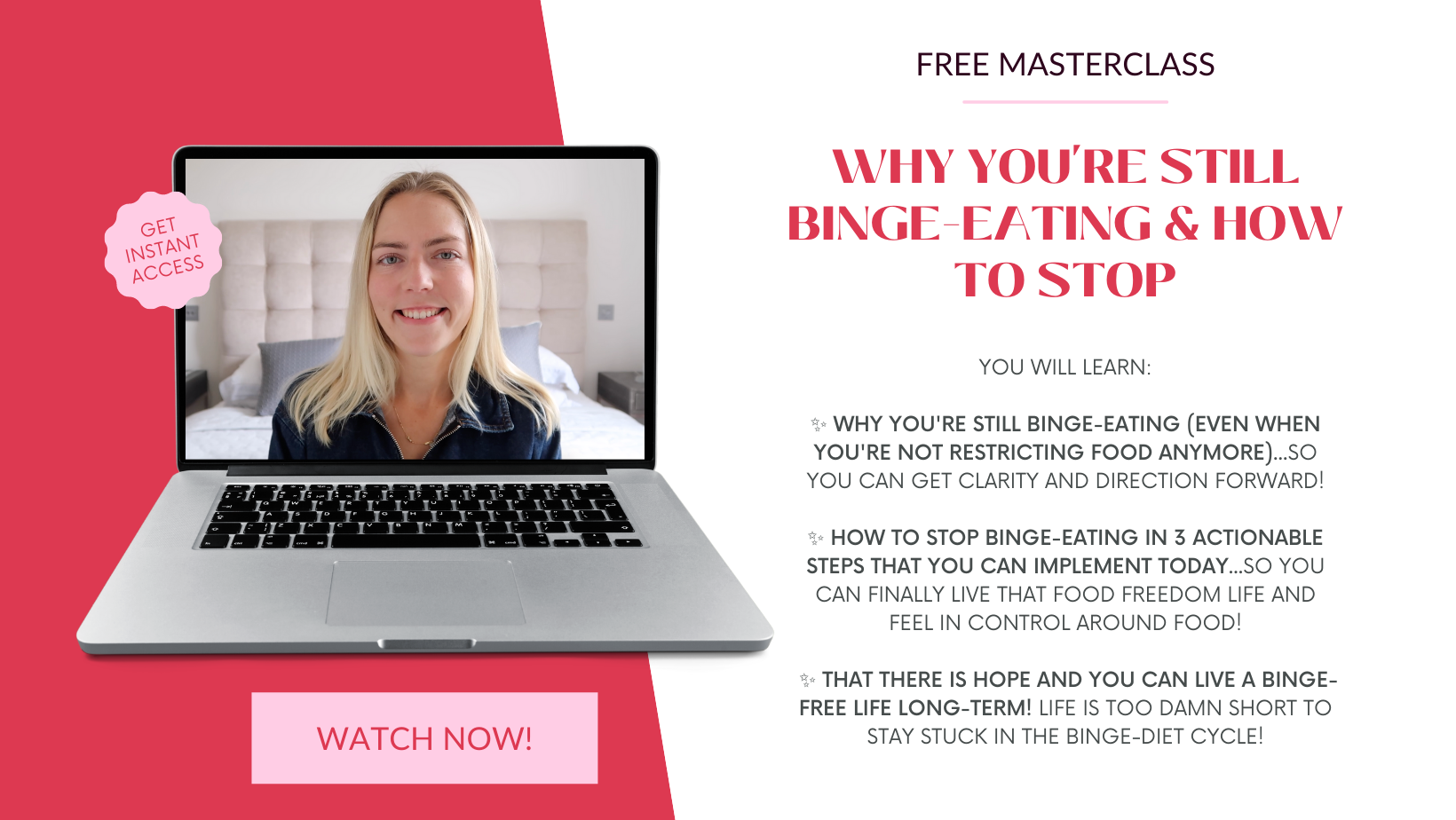What To Do After a Binge: 7 Things To Help You Get Back On Track
Oct 12, 2021
The moment after a binge can feel frustrating, distressing and sickening. It’s often when we take fear-driven action towards planning a new diet or weight loss plan to undo the effects of the binge. You likely feel guilty, ashamed and confused. You may be thinking, “Why did I do this again? It wasn't even that delicious after the first few minutes! I promised I wouldn’t buy this binge food again!”
Sound familiar?
Maybe the next day you oversleep, feel unmotivated, groggy - wishing you’d just eaten like a normal person the night before.
I’ve been there!
If you’re trying to stop binge eating but keep finding yourself stuck in this endless cycle of bingeing and dieting, then keep reading because what you do after a binge is critical in recovery.
I’m going to share 7 important things to do after a binge so that you break the binge-diet cycle once and for all.
Let’s do this!
1. BREATHE
After a binge, you’re probably feeling really bad about yourself, going into that fear-based headspace. Panic might be setting in. You’re starting to plan and strategize. I know I used to write out a meal plan for the next few days down to the exact calories per meal and snack, along with calories burned in workouts.
Those plans were always extreme and not in alignment with how I actually wanted to live. The plans never worked out - I’d only just binge a few days later again.
Breathing helps us calm down our nervous system and body after such an intense binge.
It helps you get out of that stressed headspace where you’ll probably make extreme decisions like I did.
Doing a simple breathing exercise will help soften your mind and allow you to come to stillness so you can assess the situation from a calmer place.
An example exercise is:
- Inhale through the nose
- Exhale through the mouth for 6 breaths.
- Go as slowly as you possibly can with each breath, making the exhale slightly longer.
- On every exhale allow your body to relax even more.
2. BE KIND AND COMPASSIONATE WITH YOURSELF
Now that you’re calmer through breathwork, we want to shift our self-talk from a mean, self-degrading, panicked state to a kind and compassionate one.
Has applying tough love really worked for you so far?
Instead of looking at yourself as this adult who has messed up yet again, who is just never going to change…
Let’s try something radically different - let’s be compassionate.
The easiest way to apply more understanding and compassion with yourself is to step back and view yourself as your child self.
Imagine that 5-year-old child version of you struggling. They’ve just finished bingeing and are feeling physically sick, confused, and sad at the situation. What would you say to that little child?
Are you really going to say, “See! You really are messed up, you’re going to be bingeing like this for the rest of your life because you’re pathetic”
Obviously not!
You’d probably give her a hug and softly say to her, “Are you ok? Do you need help? I see that you’re struggling and I’m here to help. I know you’ve done this before so let’s figure out what’s going on. Maybe you weren’t eating enough lately and your body was reaching out for help. Maybe you’ve been going through a tough emotional time and seeked comfort in food?”
This kindness and understanding allows you to remain more calm and not take fear-driven action (like restricting the next day). It also lifts the shame and guilt, which can also perpetuate the binge-diet cycle.
3. DO NOT RESTRICT THE NEXT DAY
That leads me to the next point: do not restrict the next day.
Would you tell that 5-year-old version of you that she’ll just have to skip some meals tomorrow or work her ass off at the gym to burn this binge off!
No way!
You’d tell her to move on, shake the binge off and nourish her body the next day as it deserves!
We know that prolonged restriction leads to binge eating later on. So this is the PERFECT time to break the cycle. As tempting as it can feel to try to fix the problem short term through restriction, reverse the ‘damage’ that’s been done and alleviate the sense of dread and guilt - we’ve got to refrain from doing this. Give yourself the gift of kindness and allow yourself to move on gracefully.
4. VIEW YOUR BINGE AS A SIGNAL
Shifting your perspective of what a binge signifies helped me a lot in recovery. Previously, I’d seen a binge as this terrible thing, I was a pig for bingeing, I’d messed up, bingeing was a huge failure.
This just led me to restrict and punish myself through exercise afterwards.
It helped when I reframed a binge as a signal that something was off. It was a signal that I needed to change the way I ate / exercised / treated myself / dealt with emotions.
I started to shake off the binges easier and move on the next day (without restriction).
I stopped seeing the binge as this big, bad monster.
5. GET CURIOUS AND LEARN FROM THE BINGE
This is the most important tip in my opinion. As mentioned, a binge is simply a signal that something isn’t quite right. And it’s your job to get curious and figure out why you are binge-eating.
From there you can start to take action towards alleviating your binge eating.
Instead of viewing the binge (and yourself) as a failure - let’s see it as a learning opportunity. Your body is giving you feedback each time it binges (or doesn’t binge).
So ask yourself: what triggered this binge? What feeling might I have been trying to get rid of with food? Had I not been eating enough lately? Had I felt perceived restriction through lots of food rules and off-limit foods? Did I forget to eat at work because I was so busy and stressed? Did I see that I’d gained weight and thought ‘Oh well, I might as well just binge then’?
Understand why you binge and take aligned action to change.
6. RELEASE THE SHAME AROUND BINGEING
Shame thrives on secrecy. Shame keeps you feeling isolated and alone in this binge-eating struggle. Shame keeps the cycle going.
Release shame through opening up to other people about it. Find people in your life that you feel safe sharing this with. They don’t necessarily have to understand why you binge (though that often feels better) or know how to help - but just being able to share your struggle with someone and receive compassion and love back can be incredibly healing.
7. GET HELP
Last but definitely not least - get support in the recovery process. Oftentimes we believe we’re the only one struggling with binge-eating because no one really talks about it. There’s a lot of shame around it.
But here’s the truth: You are NOT alone.
There are millions of people who struggle with binge-eating. And there are tons of people out there offering help as well. People who’ve been where you are, who’ve gotten out of that space and know how to help you too.
Why try to figure it all out on your own when someone has already figured it out for you.
There’s no shame in asking for help - it’s the smartest and quickest way to recovery. It’s something I WISH I had done. It would have saved me years of my life!
So get help - whether it’s online, a therapist, a course, family or friends. You’re never alone.
You don’t have to let this vicious cycle continue to consume your life anymore 💚
Start your food and body healing journey with the FREE masterclass
"Why You're Still Binge-Eating & How To Stop"


